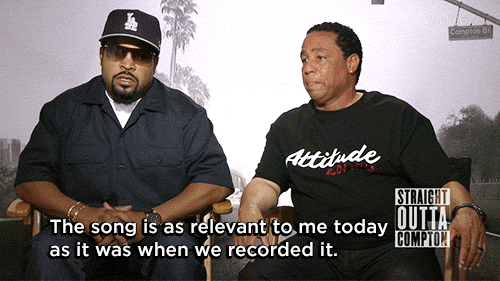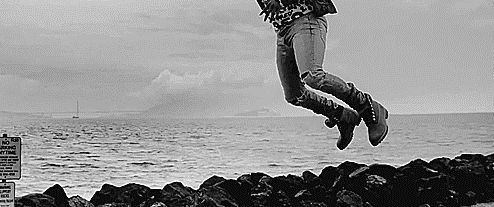Rap saves the Kids
The unlikely hero amongst the chaos and violence, Black American youth turned to hip-hop for a space to call their own. Cultivated by the funk of disco, poetry of soul, and rag of rock, hip-hop, has succeeded almost any genre of music in today’s popular culture. Though hip-hop holds the crown for dominating mainstream entertainment, it has also been a tool amongst Black American youth to depict the realities of the not so mainstream lives they live. With the South Bronx as a literal hell on earth with burning buildings and crack cocaine and South-Central Los Angeles a warzone of gang violence, disco and party songs could no longer sugarcoat the portrayal of the real United States for certain bodies. Essentially, as the words and visuals within rap became more political enticing of the “America” they lived in, Black American youth would soon become politically engaged. Through the critical analysis of Grandmaster Flash and the Furious Five’s “The Message”, N.W.A.’s “Fuck tha Police”, and Kendrick Lamar’s “Alright”, hip-hop as a framework of visual activism has in fact been an effective means of politically engaging young Black Americans. Though political activism varies in relevancy, this framework is evident in relation to education, Black Nationalism, and black healing.
Initially, the relationship between Grandmaster Flash and the Furious Five’s “The Message” and activism among Black American youth is linked to the foundation of cultural relevancy in education. Despite the fact that hip-hop was dominated by party records, Melle Mel, member of Grandmaster Flash and the Furious Five, commented on the significance of “The Message” being released; the song was “socially relevant, it had something to say” (Wheeler “Hip-Hop Evolution”). The social relevancy was rooted in the horrific reality of The South Bronx during the 70s and 80s, with the neighborhood reaching 40 fires per day and crack cocaine reaching an all-time high in New York City (McFadden, “40 Blazes Erupt in South Bronx Area”). With that being said, the lyrics within “The Message,” “it’s like a jungle sometime, it makes me wonder how I keep from goin under,” as well as the visuality of the members of the group getting arrested by white police officers while they hang out on a street corner within the music video hold cultural reference to Black America (Grandmaster Flash & The Furious Five 1982). This was one of the first times outside of soul music, that Black American youth heard lyrics and seen visuals that was entirely relevant to their lives; living in the jungles of the South Bronx and uncomfortable police relations with the black community. Through this connect, this would in turn educate and empower this demographic to vocalize the political relevancy of their lives in mainstream America. As stated within Lauren Leigh Kelly’s scholarly article, “the idea of culturally relevant teaching, ‘a pedagogy that empowers students intellectually, socially, emotionally, and politically by using cultural referents to impart knowledge, skills, and attitudes’” (Kelly 2013; 51). This song, as well as hip-hop in general, would become a tool to frame the conversation of America in a lens that was unseen of for white people, but critical to the dialect of Black America. As this song gained popularity, it would become a political anthem during Reagan’s presidency and would even be broadcasted on national television as “a hard-edged anthem of the urban ghetto” (Wheeler “Hip-Hop Evolution”). That alone proved that the scope of “The Message” was knowledge that was far more powerful than what was being broadcasted on television. Thus, Grandmaster Flash and the Furious Five’s “The Message” provided Black American youth with an educational framework to broadcast the realness of being black in America, and that in turn would be a form of activism within itself.
Additionally, N.W.A’s “Fuck tha Police” would aid as a framework of visual activism that would be an effective means of politically engaging young Black Americans through Black Nationalism. Though not as submissive as “The Message,” “Fuck tha Police” was the first hip-hop song that would transform itself into a subcategory of hip-hop, gangsta rap, and use offensive language within its composition. With a more aggressive stance on conveying the realities of being black in South Central Los Angeles, Niggas With Attitude were entirely fed up with police brutality, racial profiling and evident tension between the police and community within Compton. Through the lyrics, “Fuck tha police comin' straight from the underground, a young nigga got it bad 'cause I'm brown and not the other color so police think they have the authority to kill a minority,” they are literally saying the police are killing black people because they are simply black (N.W.A. 1988). As the song gained popularity, it would spark political rag amongst parents, politicians, and police offices all over the country. Yet soon after the acquittal of four white police officers charged with assault and the use of excessive force on Rodney King, African American taxi driver, in 1991, tension between the police and the black community became far more hazardous with Los Angeles riots emerging. The song would soon become the literal representation of how Black American youth felt toward the police in all parts of America, and yet it would also hold Black Nationalist sentiment. Stated within Bonnette Lakeyta’s piece, “Black Nationalism can be defined as ‘a body of social thought, attitudes and actions ranging from the simplest expressions of [Black] ethnocentrism and racial solidarity to the comprehensive and sophisticated ideologies of Pan-Negroism or Pan Africanism’" (Bonnette 2012; 166). Given a Malcolm X approach to Black Nationalism, this song was a testament to the barbaric conditions of Black America and as more cases accumulated regarding the death of unarmed black people under the hands of white offices, the more racial solidarity through these riots became evident. Though these actions were violent, these were outcries for political change by a community that was and continuously is neglected of their problems and in turn screamed the infamous words of N.W.A. “fuck tha police.”
Although Kendrick Lamar’s “Alright” does not hold the same radical language as “Fuck tha Police,” the lyrics and visuals are just as powerful in providing a framework of visual activism that would be an effective means of politically engaging young Black Americans through black healing. Different in time period, yet Kendrick Lamar’s “Alright” is very much influenced from the other two songs in terms of political nuances. Moreover, the relationship between the police and the black community has still remained problematic with the death of Michael Brown, Eric Garner, Philando Castile, etc., all unarmed black men murdered under the hands of police officers. The composition of this song would not only reflect this conflict, but entice feelings of hope that has always been relevant to the Civil Rights Movement and now Black Lives Matter Movement. With images of black children in white clothing joyfully running up a hill and the lyrics “I'm at the preacher's door, my knees gettin' weak and my gun might blow but we gon' be alright” echoing the music video, Kendrick has morphed the harsh rhymes of rap and black faith in gospel music to provide the black youth of America a new realm of political activism, black healing in action (Kendrick Lamar 2015). Though it could be argued by many that black healing is not a form of political activism, yet in order for black people to be active participants in society and properly communicate their aggressions due the institutionalized racism of America, black healing is essential in and through the livelihood of young black Americans. The spirituality of the song along with the offensive vernacular of some of the words becomes revenant to the anger yet heavy religious sector within the black community of America. To emphasize, “research studies with African Americans concur that FKS (formal kinship support) and spirituality are among the commonly used coping mechanisms” (Jones 2007; 129). As a method of healing, the words of this song would be echoed in marches and protests all over the world and in one specific case, “when people gathered to protest a rally for Republican presidential candidate Donald Trump, "We gon' be alright!" was sung in celebration of the rally's cancellation” (Gilbert “Kendrick Lamar's Civil Rights Anthem 'Alright' Almost Didn't Happen”). A shift in political participation by the black youth of America would still remain powerful, yet it would be focused more on the healing process and allowing black people to feel “alright” in the face of adversity.
Through the critical analysis of Grandmaster Flash and the Furious Five’s “The Message,” N.W.A.’s “Fuck tha Police,” and Kendrick Lamar’s “Alright,” hip-hop as a framework of visual activism has in fact been an effective means of politically engaging young Black Americans. Though political activism varies in relevancy, this framework is evident in relation to education, Black Nationalism, and black healing. Hip-hop like no other art form has been a friend to many black teenagers of America and continues to set forth new methods of political activism within the black community. Although the South Bronx and South-Central Los Angeles are not in complete shambles; poverty, community violence, and police brutality are still reoccurring issues that the United States government has done very little to eradicate. Hip-hop, however, will remain the brutality honest and rhythmic news channel for Black America and its hope for the future. -




Bonnette, Lakeyta M. "BLACK POLITICAL ATTITUDES AND POLITICAL RAP MUSIC 1."
Ethnic Studies Review, vol. 35, no. 1, 2012, pp. 157-0_12. ProQuest,
https://search-proquest-com.libezproxy2.syr.edu/docview/1717277071?accountid=14214.
Gilbert, Ben. “Kendrick Lamar's Civil Rights Anthem 'Alright' Almost Didn't Happen.” Business
Insider, Business Insider, 25 Oct. 2016, uk.businessinsider.com/kendrick-lamar-alright
2016-10.
Jones, Janine M. “Exposure to Chronic Community Violence: Resilience in African American
Children” Journal of Black Psychology, vol. 33, no. 2, 2007 pp. 125-149. SAGE Journals
Kelly, Lauren L. "Hip-Hop Literature: The Politics, Poetics, and Power of Hip-Hop in the English
Classroom." English Journal, vol. 102, no. 5, 2013, pp. 51-56. ProQuest,
https://search. proquest-com.libezproxy2.syr.edu/docview/1353651858?accountid=14214.
“Kendrick Lamar – Alright.” Genius, 15 Mar. 2015, genius.com/Kendrick-lamar-alright-lyrics.
“Grandmaster Flash & The Furious Five (Ft. Duke Bootee & Grandmaster Melle Mel) – The
Message.” Genius, 1 Oct. 1982, genius.com/Grandmaster-flash-and-the-furious-five-the
message-lyrics.
McFadden, Robert D. “40 Blazes Erupt in South Bronx Area.” The New York Times, The New
York Times, 3 June 1975, www.nytimes.com/1975/06/03/archives/40-blazes-erupt-in-south
bronx-area-40-fires-18-major-ones-erupt-in.html.
“N.W.A – Fuck Tha Police.” Genius, 9 Aug. 1988, genius.com/Nwa-fuck-tha-police-lyrics.
Wheeler, Darby, et al. “Hip-Hop Evolution.” Netflix Official Site, 2 Dec. 2016,
www.netflix.com/watch/80141894?trackId=13752289&tctx=0%2C1%2Cdfdf93f9-3971
462c-86ec-6fdc8bb80ffa-9254015%2C%2C.
I own no rights to any of the images used within this post. Originally a paper on visual activism.